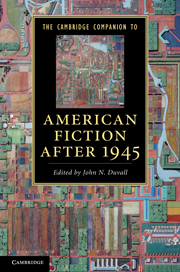Book contents
- Frontmatter
- Introduction: A story of the stories of American fiction after 1945
- PART I POETICS AND GENRES
- PART II HISTORICAL AND CULTURAL CONTEXTS
- 6 African American fiction
- 7 American Indian fiction
- 8 Multiethnicities: Latino/a and Asian American fiction
- 9 American Jewish Fiction
- 10 Feminist fiction
- 11 Southern fiction
- 12 Fiction and the Cold War
- 13 Fiction and 9/11
- PART III MAJOR AUTHORS
- Conclusion: Whither American fiction?
- Index
- Cambridge Companions to …
12 - Fiction and the Cold War
from PART II - HISTORICAL AND CULTURAL CONTEXTS
Published online by Cambridge University Press: 28 March 2012
- Frontmatter
- Introduction: A story of the stories of American fiction after 1945
- PART I POETICS AND GENRES
- PART II HISTORICAL AND CULTURAL CONTEXTS
- 6 African American fiction
- 7 American Indian fiction
- 8 Multiethnicities: Latino/a and Asian American fiction
- 9 American Jewish Fiction
- 10 Feminist fiction
- 11 Southern fiction
- 12 Fiction and the Cold War
- 13 Fiction and 9/11
- PART III MAJOR AUTHORS
- Conclusion: Whither American fiction?
- Index
- Cambridge Companions to …
Summary
In the “Epilogue” to Ralph Ellison's Invisible Man, the anonymous narrator says, “I was never more hated than when I tried to be honest … On the other hand, I've never been more loved and appreciated than when I tried to ‘justify’ and affirm someone's mistaken beliefs; or when I've tried to give my friends the incorrect, absurd answers they wished to hear.” When juxtaposed with the novel's final line – “Who knows but that, on lower frequencies, I speak for you?” – this statement suggests how much Invisible Man functions as a quintessential Cold War narrative, in addition to being, arguably, the definitive novel of pre-desegregation African American literature. Ellison's Epilogue, in other words, gives his modernist representation of African American history and culture a Cold War interpretation, replete with its sense of, and fear about, the ethos of conformity.
That ethos, memorably named other-directedness in David Riesman's 1950 bestselling sociological study, The Lonely Crowd, is posited on Riesman's belief that the notion of a social character is more or less accepted fact. A troubling new social character, Riesman argued, was starting to dominate twentieth-century urban America. Cultures ranging from prehistoric Africa and pre-Christian Athens to the pre-Columbian Americas, from the Ptolemaic Dynasty and the Ming Dynasty to contemporary Japan and Italy had shared the same social character, which he labeled tradition-directed.
- Type
- Chapter
- Information
- The Cambridge Companion to American Fiction after 1945 , pp. 167 - 180Publisher: Cambridge University PressPrint publication year: 2011
- 2
- Cited by

